Welcome fellow Recovering Traditionalists to Episode 5 where we take a look at how Bandaids and Bandwagons are something you need to avoid when teaching mathematics.
Today we are talking about a quote from Faster Isn’t Smarter by Cathy L. Seeley. In this book, Cathy addresses a different topic in each chapter. Things like “Making the Case for Creativity”, “Technology is a Tool”, “More Math, More Dropouts?” and in this episode I’m pulling a quote from the chapter titled “Beyond Band-Aids and Bandwagons.”
Before I read the quote I want you to think about if your school or district has used Band-Aids and Bandwagons. A Band-aid is a superficial treatment that doesn’t get at the source of the problem. An example Cathy gives in the book is how districts will limit class sizes and mandate a specific amount of instructional time be spent on a topic, but they haven’t changed how that instructional time is used. Bandwagons are when a school or district adopts the latest fad. Not all of these “latest fads” are bad things. In fact many are based on solid research, however we have a tendency in education to jump to the next best thing before we’ve had a chance to fully implement and allow that implementation to take effect. So let’s read the quote from the book that I’d like to talk about:
“Often schools get caught up in adopting something just enough to use its label, rather than implementing the critical attributes or underlying research-based philosophy intended by that label. Not only can such a superficial implementation shortchange students, but the label itself can sometimes ignite opposition. This alone is one reason for leaders to consider avoiding labels in favor of description. Instead of saying that the school system is adopting reform mathematics, why not talk about building a balanced program of conceptual understanding, problem solving, and skill development?” p.62
If your school system can describe what they want math education to be like, then when you are contemplating something that could be a Band-aid or a Bandwagon you can weigh it against your description of what math education is supposed to be at your school. You shouldn’t be adopting a new curriculum or implementing math workstations and using that label as what your math program is. I hear things all the time like “We do Engage or We do Guided Math”, those are just labels. I want to encourage you to have your school really look at WHY you are doing that and create a description of what math class should be like for your students. The same is true for Build Math Minds… I really don’t want this concept of Building Math Minds to be a bandwagon. I want you to learn the research about what you are implementing. Go deep with it so that you aren’t just doing surface level work on it. I’ve seen people who say they are implementing this or that but they do it in a way that is still rooted in our old traditional ways. If you are going to implement something DEMAND training on it so that your school system can create a description of what you are doing and not just putting a Band-aid on or jumping on a Bandwagon.
Resources mentioned in this episode:
Build Math Minds PD site: buildmathminds.com/bmm
Faster Isn’t Smarter by Cathy Seeley
**Use code BOOKS40 on the Math Solutions website to get 40% off the book.
Subscribe and Review in iTunes
Hey, are you subscribed to the Build Math Minds Podcast, yet? If you’re not, make sure to do that today because I don’t want you to miss any episodes! Click here to subscribe to the podcast in iTunes.
While you’re there, don’t forget to leave a review on iTunes too. I would love to know your thoughts and how we can make sure that we give you content that you will really enjoy.
To leave a review, head over to iTunes and click on “Ratings and Reviews” and “Write a Review.” I can’t wait to hear your thoughts about the podcast.





Hi Christina!
I really am enjoying your Podcasts. Thank you for providing them for your audience. I totally agree with you and really liked the part of the quote that said… “why not talk about building a balanced program of conceptual understanding, problem solving, and skill development?” I haven’t seen this happen in my school. I just think there is a lack of knowledge of how kids learn math and that the conceptual understanding is so important. Our district uses the NYS modules Teachers were never taught the significance of all the number sense building activities that are apart of the modules so they would skip over them. Thank you so much for your BMM community. I feel like I am always learning something new and it’s always so helpful with my work with my RtI math students. Thank you again for expanding my math mind!